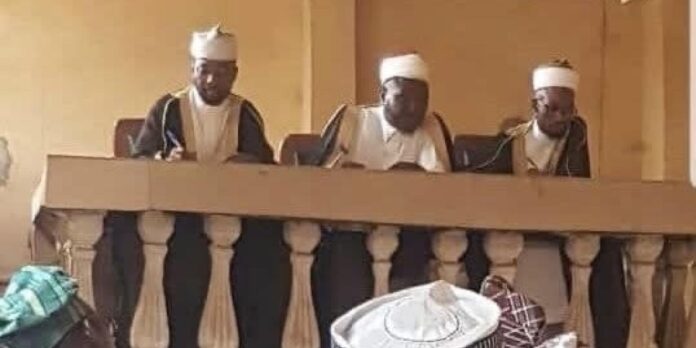The Ekiti State Government has dismissed recent reports about the establishment of a Sharia Court or an Independent Sharia Arbitration Panel in the state. This clarification came in response to claims that such a panel had begun its operations in Ado-Ekiti, where it reportedly handled marriage-related disputes earlier this week.
The Independent Sharia Arbitration Panel, presided over by three Kadhis—Imam Abdullahi Abdul-Mutolib, Imam Abdulraheem Junaid-Bamigbola, and Dr. Ibrahim Aminullahi-Ogunrinde—was said to have held its first sitting at the Ado-Ekiti Central Mosque. During the sitting, the panel adjudicated two cases concerning Islamic marriages. However, the state government quickly responded with an official statement denying the existence of such a body within Ekiti’s judicial structure.
In a statement released on Thursday, the State Attorney-General and Commissioner for Justice, Mr. Dayo Apata (SAN), made it clear that there was no Sharia Court or Sharia Arbitration Panel in the state. He emphasized that the panel, as reported, was not a part of the state’s judicial framework, stressing that arbitration and mediation fall under “quasi-judicial” matters that are regulated by law in Ekiti.
Apata explained that Ekiti State has a well-established legal system that handles a variety of cases, including marriage and inheritance disputes, through the Customary Court, Customary Court of Appeal, and the High Court. He pointed out that these courts have been successfully handling matters related to Islamic, Christian, and traditional marriages without any significant issues.
“The Sharia Courts in the northern part of Nigeria are similar to the Customary Courts in the southern region,” Apata explained. “Both systems handle matters related to marriages, inheritance, and customary issues, with appeals going to the appropriate Court of Appeal in each region.” He further clarified that in Ekiti State, the Customary Courts and the Customary Court of Appeal are equipped to handle issues arising from Yoruba traditional marriages, Islamic marriages, and Christian marriages, particularly those that are not backed by statutory marriages.
While he acknowledged that matters of religion are sensitive and must be handled carefully, Apata warned against any actions that might disrupt the peace in the state. He emphasized that the Ekiti State Government is committed to maintaining peaceful coexistence among all residents, regardless of their religious or cultural backgrounds.
The clarification comes at a time when political activities in the state are intensifying, as the race for the 2026 governorship election begins to take shape. Apata suggested that some opposition members, unable to challenge the achievements of the current administration, might be resorting to unethical practices, including the spreading of false information, to undermine the state’s leadership.
“The government is aware of the political maneuvering happening as the 2026 election approaches. We will not tolerate any actions that seek to create division or unrest among the people of Ekiti,” Apata said. He cautioned religious leaders to be cautious of being used as political tools by opposition figures and other individuals with ulterior motives.
In his concluding remarks, Apata reiterated the government’s commitment to upholding the Constitution and maintaining peace in the state. He assured residents that the government would take all necessary measures to ensure that the state’s laws are respected and that any attempts to disrupt public order would be met with the full force of the law.
Ekiti State, like many parts of Nigeria, is known for its rich cultural and religious diversity. The state has long been a peaceful example of how different groups, including Christians, Muslims, and adherents of traditional religions, can coexist harmoniously. The government’s position on this issue reflects its ongoing efforts to maintain this peaceful environment, even as political tensions rise ahead of future elections.
The controversy surrounding the existence of a Sharia Arbitration Panel also highlights the complex relationship between religion and the state in Nigeria, particularly in matters of family law. While some regions in the north have long had Sharia Courts, the southern states, including Ekiti, have adopted a different approach, relying on customary and statutory courts to handle marriage and inheritance issues. This difference has occasionally led to misunderstandings and controversies, as seen in the recent reports from Ekiti.
In the past, the introduction of Sharia law in northern Nigeria has sparked debates about the role of religion in the country’s legal system. Critics of the Sharia system argue that it could create divisions along religious lines, while supporters believe it is necessary to preserve cultural and religious values within their communities. In Ekiti, where the population is predominantly Christian and Yoruba, the state government has been cautious in maintaining a secular legal system that respects religious diversity without favoring any particular faith.
The State’s clarification aims to prevent any escalation of tensions in Ekiti, ensuring that the people understand that no new legal bodies, such as the Sharia Arbitration Panel, have been established outside the state’s existing judicial framework. Apata’s statement serves to reassure the public that any disputes related to marriage, inheritance, and other customary matters will continue to be handled by the existing courts, which are equipped to address these issues fairly and without bias.

